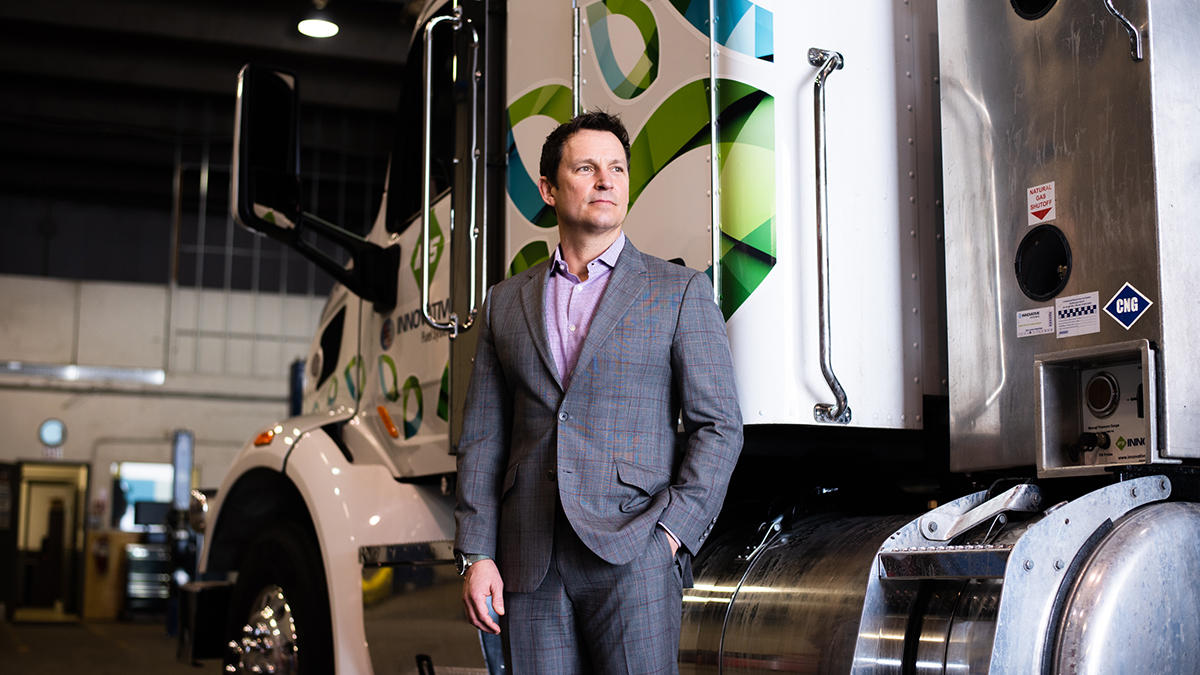Contributing to a net-zero world
Brea Elford - 13 September 2021
Leland Oberst (BCom ‘91) has always been a self-proclaimed “entrepreneur at heart,” even running a couple of businesses throughout high school and university before beginning a successful corporate career that took him around the world working for large companies.

So when the opportunity came for him to leave his comfortable position as managing partner at Deloitte to start his own tech company at 47-years-old, he was ready.
From the corporate world to entrepreneurship
“I had a wonderful career and really enjoyed the work because I followed my passion and my dreams, but I just always had that itch,” said Oberst, founder and CEO of Innovative Fuel Systems (IFS), an Edmonton-based tech startup.
“I always wanted to give it a shot to build something else.”
IFS’ technology allows heavy-duty diesel truck engines to replace 50% of diesel fuel with natural gas, not only reducing the amount of greenhouse gas emissions released by a truck at any given time, but also providing a more cost-efficient alternative for trucking companies.
“It’s a good hybrid solution for our customers because natural gas is in abundance and cheap in North America and increasingly, we’re seeing our customers focus on ESG (environmental, social and governance) policies,” said Oberst, who was born in Provost, Alberta but moved to Edmonton at a young age.
When Oberst began seriously considering a jump to entrepreneurship from the corporate world, he knew he wanted to start a technology company in the oil and gas sector. Understanding that the heavy-duty trucking industry contributes 6.6% and 6.4% of the Canadian and US GHG emissions respectively, he knew the market was poised for disruption.
IFS has developed an after-market, non-intrusive kit that is outfitted on trucks after the engine is built — a key factor is that the patent-pending technology doesn’t impact the original engine manufacturer warranty, which will allow the company to rapidly expand internationally.
Like many businesses, IFS faced some challenges when COVID-19 hit in early 2020 — manufacturing and shipping as well as investment delays — but thanks to previous angel investor money as well as his own financial contribution, Oberst was still able to move forward, even growing his company from seven to thirteen employees during that time.
“It was a hard time, but it's not lost on me that I wasn’t a single mom or dad that lost a restaurant job or small business,” said Oberst.
Currently, the technology is being commercially piloted on six trucks with KAG Canada (formerly Westcan Bulk Transport), but with industry watching closely and the phones already ringing with interest, Oberst expects it to take off.
“The next twelve months are going to be a really exciting time.”
Giving back
Grateful for his university experience, Oberst has committed to giving back to the Alberta School of Business, most recently sitting on the Business Advisory Council for seven years.
“I think of what I invested in time and money in the school and I definitely got out of it in spades,” he said.
“I’ve had a wonderful career and have fostered tremendous, long-lasting relationships that wouldn’t have been possible without the Alberta School of Business.”
Oberst knows that many people aren’t in a position to invest financially, and encourages alumni to contribute to the school’s success in other ways. For Oberst, he said he plans to continue investing his time — whether that’s helping individual students or professors — and when the time is right, he’ll invest more financially, as well.
“I feel that we’re not done,” said Oberst.
It’s been 35 years since the Alberta School of Business building was built, and new practices for how students best learn and engage have emerged. Down the road, Oberst would love to see a new business school built in Edmonton. While a new building is not part of the near future, the new student collaboration space in the former Winspear Library will become a leading-edge facility that creates vibrancy and allows the school to remain globally competitive. Its ethos and design will enable all learning opportunities and student services to come together, and it will be where students gain real-world experience and build connections. The student collaboration space will open in fall 2022.
“I think that as a business school, we’ve undersold ourselves, and the momentum we will get moving forward will be phenomenal.”
One thing is for sure — Oberst is just getting started.
Help Make an Impact
Learn More
Please contact our team to discuss how you can make a difference:
Sarah Kowalevsky
Assistant Dean, Development
sarah.kowalevsky@ualberta.ca